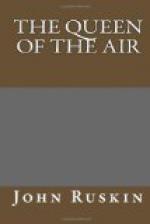62. And we are led to feel this still more strongly because all the distinctions of species,* both in plants and animals, appear to have similar connection with human character. Whatever the origin of species may be, or however those species, once formed, may be influenced by external accident, the groups into which birth or accident reduce them have distinct relation to the spirit of man. It is perfectly possible, and ultimately conceivable, that the crocodile and the lamb may have descended from the same ancestral atom of protoplasm; and that the physical laws of the operation of calcareous slime and of meadow grass, on that protoplasm, may in time have developed the opposite natures and aspects of the living frames but the practically important fact for us is the existence of a power which creates that calcareous earth itself, —which creates, that separately—and quartz, separately; and gold, separately; and charcoal, separately; and then so directs the relation of these elements as that the gold shall destroy the souls of men by being yellow; and the charcoal destroy their souls by being hard and bright; and the quartz represent to them an ideal purity; and the calcareous earth, soft, shall beget crocodiles, and dry and hard, sheep; and that the aspects and qualities of these two products, crocodiles and lambs, shall be, the one repellant to the spirit of man, the other attractive to it, in a quite inevitable way; representing to him states of moral evil and good; and becoming myths to him of destruction or redemption, and, in the most literal sense, “words” of God.
* The facts on which I am about to dwell are in nowise antagonistic to the theories which Mr. Darwin’s unwearied and unerring investigations are every day rendering more probable. The aesthetic relations of species are independent of their origin. Nevertheless, it has always seemed to me in what little work I have done upon organic forms, as if the species mocked us by their deliberate imitation of each other when they met; yet did not pass one into another.
63. And the force of these facts cannot be escaped from by the thought that there are species innumerable, passing into each other by regular gradations, out of which we choose what we must love or dread, and say they were indeed prepared for us. Species are not innumerable; neither are they now connected by consistent gradation. They touch at certain points only; and even then are connected, when we examine them deeply, in a kind of reticulated way, not in chains, but in chequers; also, however connected, it is but by a touch of the extremities, as it were, and the characteristic form of the species is entirely individual. The rose nearly sinks into a grass in the sanguisorba; but the formative spirit does not the less clearly separate the ear of wheat from the dog-rose, and oscillate with tremulous constancy round the central forms of both, having each their due relation to the mind of man. The great animal kingdoms are connected in the same way. The bird through the penguin drops towards the fish, and the fish in the cetacean reascends to the mammal, yet there is no confusion of thought possible between the perfect forms of an eagle, a trout, and a war-horse, in their relations to the elements, and to man.




